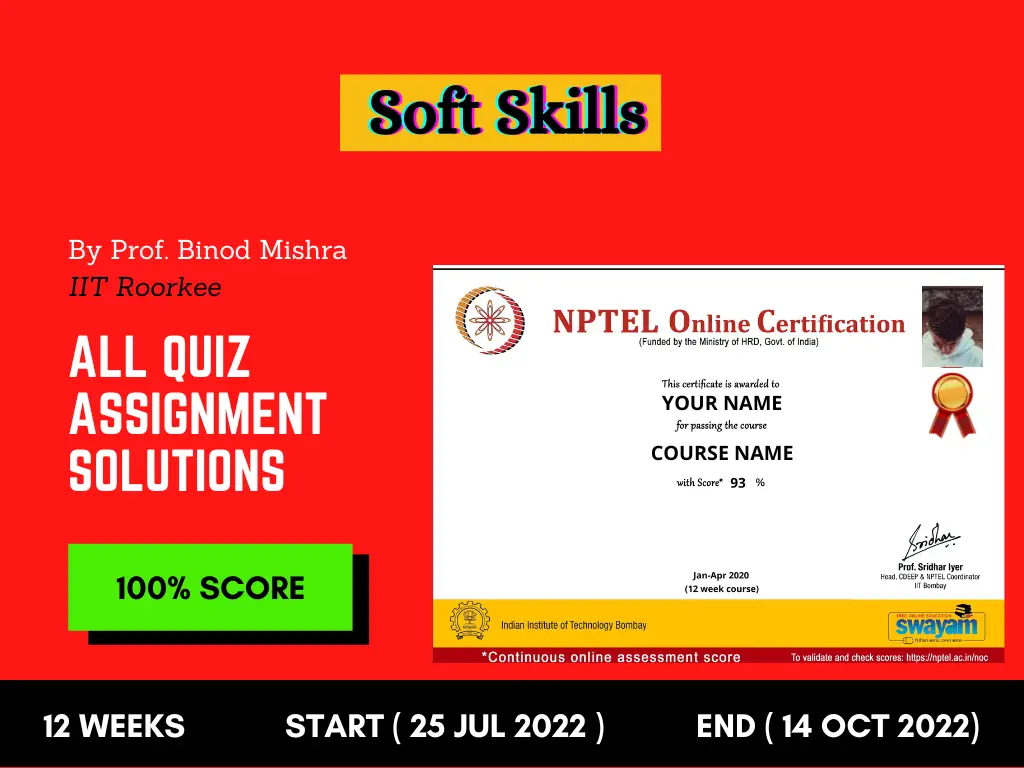This set of MCQ(multiple choice questions) focuses on the Soft Skill Development NPTEL Week 7 Solutions.
Soft Skills, a buzz word today, has attracted the attention of students, professionals and entrepreneurs all over the world. Every individual wants to get a coveted job. In a fast changing world, it’s important to prove multiple skills in different situations. The course aims at creating awareness among the stock holders of the corporate world in which the role of individuals as team players and also as responsible leaders materializes to a great extent. The course, with its interactive and need based modules, will address various challenges of communication as well as behavioural skills faced by individuals at workplace and organizations in bridging the gaps through effective skills of interviews, group discussions, meeting management, presentations and nuances of drafting various business documents for sustainability in today’s global world.
Course layout
Answers COMING SOON! Kindly Wait!
Week 1: Assignment answers
Week 2: Assignment answers
Week 3: Assignment answers
Week 4: Assignment answers
Week 5: Assignment answers
Week 6: Assignment answers
Week 7: Assignment answers
Week 8: Assignment answers
Week 9: Assignment answers
Week 10: Assignment answers
Week 11: Assignment answers
Week 12: Assignment answers
NOTE: You can check your answer immediately by clicking show answer button. Soft Skill Development NPTEL Week 7 Solutions” contains 15 questions.
Now, start attempting the quiz.
Soft skill development NPTEL week 7 Solutions
Q1. Motivation is a psychological force that contributes to a person’s degree of commitment which includes drives and desires for goal attainment that regulate the direction, intensity, and persistence of human action.
a) Correct
b) Incorrect
Answer: a) Correct
Q2. Persuasion is an interactive communication process that may take place whenever we want something from someone else or another person wants something from us.
a) True
b) False
Answer: b) False
Q3. For persuasion to be subtle and devious, it should use channels that are easily noticeable.
a) True
b) False
Answer: b) False
Q4. Listening is the mother of all communication, and to become an effective communicator one has to be good listener.
a) True
b) False
Answer: a) True
Q5. ____________ is a neurotransmitter that plays a key role in motivation, productivity, and focus.
a) Serotonin
b) Dopamine
c) Epinephrine
d) None of the above
Answer: b) Dopamine
Q6. ________________ involves discussion and reaching a mutually satisfactory agreement.
a) Persuasion
b) Motivation
c) Negotiation
d) Communication
Answer: c) Negotiation
Q7. Which of the following components are the components of motivation?
a) Direction
b) Effort
c) Persistence
d) All of the above
Answer: d) All of the above
Q8. Which part of a message is usually remembered more readily?
a) First part
b) Main body of the argument
c) Title
d) Last part
Answer: d) Last part
Q9. The attitude of dislike towards cold drinks because of their high sugar content is based on
a) Knowledge
b) Extremity
c) Ad campaign
d) Ego-involvement
Answer: a) Knowledge
Q10. In which of the following negotiating style, individuals easily give the other person concession in hope of strengthening their relationships but tend to neglect their own needs in favour of helping the other person.
a) Avoider negotiating style
b) Compromiser negotiating style
c) Problem solver negotiating style
d) Accommodator negotiating style
Answer: d) Accommodator negotiating style
Q11. The relevance of the art of persuasion lies in
a) Providing people with your side of the story
b) Appearing convincing to others
c) Motivating others
d) Converting others to your point of view
Answer: c) Motivating others
Q12. Which of the following characteristics determine the leadership style of a task leader?
a) Always allows everyone to get a turn in the discussion
b) Always keeps the personal relationships between group members
c) Always make sure the group reaches a conclusion at the end of the meeting
d) All of the above
Answer: c) Always make sure the group reaches a conclusion at the end of the meeting
Q13. Consider the following statements.
A. A good leader is a great communicator.
B. A good leader never listen to the team members.
C. A good leader leads through experience and competence.
a) Only A is correct
b) Only A and C are correct
c) Only B and C are correct
d) All A, B and C are correct
Answer: b) Only A and C are correct
Q14. Consider the following statements.
A: If you’re intelligent, you can see through persuasion.
B: Advice is not a kind of persuasion.
a) A and B are true
b) A is true but B is false
c) B is true but A is false
d) Both A and B are false
Answer: d) Both A and B are false
Q15. Consider the following statements.
A: Persuasion is about changing attitudes.
B: Attitude is an arbitrary psychological construct.
C: It is difficult to imagine a context where there is no persuasion of any kind.
a) All A, B and C are true
b) Only C is true
c) Only B and C are true
d) Only A and C are true
Answer: d) Only A and C are true
<< Prev- Soft Skill Development Week 6 Assignment Solutions
>> Next- Soft Skill Development Week 8 Assignment Solutions
DISCLAIMER: Use these answers only for the reference purpose. Quizermania doesn't claim these answers to be 100% correct. So, make sure you submit your assignments on the basis of your knowledge.For discussion about any question, join the below comment section. And get the solution of your query. Also, try to share your thoughts about the topics covered in this particular quiz.
Checkout for more NPTEL Courses: Click Here!

